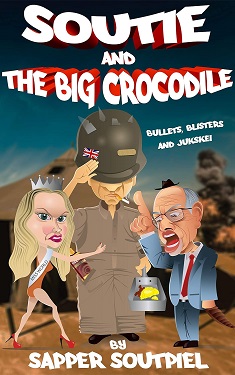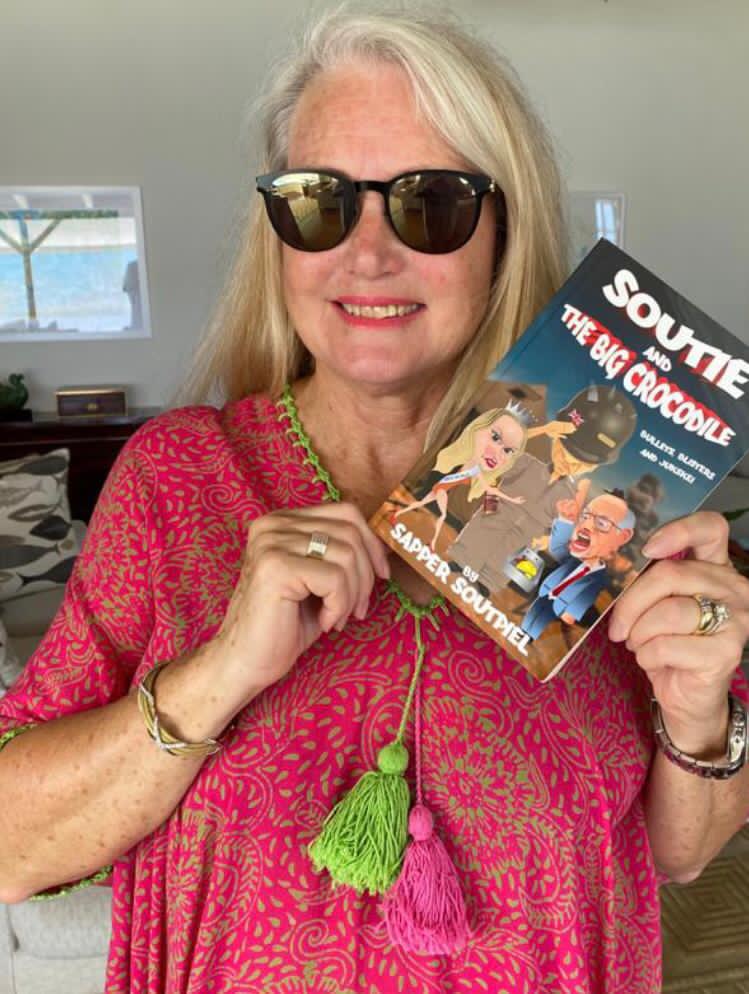 Soutie and the big crocodile is the humorous, rambling, nostalgic memoir of Sapper Soutpiel, as he relives, recounts and pens two years of 'national service', that was the obligation and rite of passage of all white male South Africans, in apartheid South Africa during the 1980s.
Soutie and the big crocodile is the humorous, rambling, nostalgic memoir of Sapper Soutpiel, as he relives, recounts and pens two years of 'national service', that was the obligation and rite of passage of all white male South Africans, in apartheid South Africa during the 1980s.
The memoir is thus inescapably set against the political background of South Africa under the rule of the (Christian) Nationalist Party government; led by the authoritarian PW Botha, commonly known as 'die groot krokodil' (the big crocodile).
It's a moving, but humorous tribute to the hundreds of thousands of young, white South African men who - hardly more than boys - were wrenched from home to be conscripted ('press-ganged' under threat of jail-time) into the South African Defence Force, to defend the country from the 'rooi gevaar' (communist threat) and 'swart gevaar' (racial reference to threat of black power or rule) ... whether they believed in that cause, or not.
And while immigrants to South Africa had been exempt from national service, PW Botha - in 1984 - ushered in a law that made conscription obligatory for immigrants to South Africa, like Soutie who emigrated with his family, from England to South Africa, in 1977.
Thus, Soutie (Soutpiel) acquired his name, as one of those with one foot in Europe, another in Africa and a salty penis (soutpiel) that thus hung in the Atlantic Ocean ... and so suspected to have divided loyalties, because of his British origins.
Soutie thus exposes the rift between English and Afrikaans-speaking South Africans, that dates back to the Anglo-Boer war; now thrust together by a common obligation that was not equally believed, nor shared.
So it was that Soutie found himself in the engineers (sapper) corps to undergo basic training in Kroonstad, miles away from home; to become Sapper Soutpiel and fulfill his obligations to a government considered illegitimate by the international community.
The stage is thus set for Soutie to tell his tale of survival, subjected to torturous forms of 'character-building' training that would otherwise be considered outright abuse. Experiences best expressed in idioms of the Afrikaans language - rondfok, opfok to gatvol and bosbefok - that provides some insight into the Christian Nationalist (Afrikaner) culture that dominated South Africa at the time.
For this Soutie provides a helpful glossary of weermag taal, although I have some doubts about his spelling of some of these terms; which suspicions were confirmed with reference to the SA Legion's Glossary of Military Terms, a minor oversight considering Soutie's Anglo-Saxon origins.
And so he weaves a nostalgic and humorous - laugh a page - retrospective of survival within the political milieu, forced upon Soutie by the big crocodile. Survival, without the comforts of home and family, living on meager army rations, to be broken-down to become a soldier, trained to fight a war that had no real enemy, guarding a camp that hardly needed defending and learning how to gippo the system; all interwoven with flashbacks to his life in England, the friends he made in South Africa, his unquenchable thirst for alcohol and tobacco.
This against the backdrop of political events, which led to the watershed appointment of FW De Klerk as President, who then announced the release of Nelson Mandela, unbanning of the ANC and eradication of 'national service'; which led many to conclude 'so what the fuck was that all about then?'
 The reader will find many references to icons of the 80s, like former Miss World, Anneline Kriel, with whom Soutie develops a fantasy relationship, Scope magazine (which fuelled many fantasies), Sonja Herholdt, Omo washing powder, Bles Bridges and some other icons-to-be like Wendy Oldfield, with whom Soutie shared many a zol.
The reader will find many references to icons of the 80s, like former Miss World, Anneline Kriel, with whom Soutie develops a fantasy relationship, Scope magazine (which fuelled many fantasies), Sonja Herholdt, Omo washing powder, Bles Bridges and some other icons-to-be like Wendy Oldfield, with whom Soutie shared many a zol.
Icons and artifacts that any white South African between 50 and 70 years of age, will remember as something like Dickens' 'they were the worst of times, they were the best of times'.
While the humour is at times contrived, every page entertains with often hilarious, richly described anecdotes, that keep the reader's attention; and Soutie left page 324 blank in case you need to take notes or tear it out for that zol you want to smoke in between laughs. Many of the photographs are so badly reproduced, you might want to use those as well!
Soutie's memoir serves as a moving, nostalgic trip down memory-lane for those generations of white, male South Africans who did their 'service' and of course their wives and girlfriends, mothers and fathers, from whom they were wrenched away and shared in their suffering.
It also provides a fascinating historical insight for anyone interested in understanding the Christian Nationalist milieu; and the fractious nature of 'white' hegemony. A perspective completely lost on a new generation of young South Africans, who have little concept of the variety of the white tribes of Europe that arrived to make a home on the southern tip of Africa.
Regrettably, you won't find the memoir in any bookshop ... it's a self-published work, available only on Amazon as an eBook; but drop Soutie an email (mikepakster@yahoo.com) and he'll be happy to give you a copy in exchange for lunch and a few beers at Forries pub in Newlands - that's where I got mine.
- (195)

 Soutie and the big crocodile is the humorous, rambling, nostalgic memoir of Sapper Soutpiel, as he relives, recounts and pens two years of 'national service', that was the obligation and rite of passage of all white male South Africans, in apartheid South Africa during the 1980s.
Soutie and the big crocodile is the humorous, rambling, nostalgic memoir of Sapper Soutpiel, as he relives, recounts and pens two years of 'national service', that was the obligation and rite of passage of all white male South Africans, in apartheid South Africa during the 1980s. The reader will find many references to icons of the 80s, like former Miss World, Anneline Kriel, with whom Soutie develops a fantasy relationship, Scope magazine (which fuelled many fantasies), Sonja Herholdt, Omo washing powder, Bles Bridges and some other icons-to-be like Wendy Oldfield, with whom Soutie shared many a zol.
The reader will find many references to icons of the 80s, like former Miss World, Anneline Kriel, with whom Soutie develops a fantasy relationship, Scope magazine (which fuelled many fantasies), Sonja Herholdt, Omo washing powder, Bles Bridges and some other icons-to-be like Wendy Oldfield, with whom Soutie shared many a zol.
 click : to top
click : to top mouseover : back
mouseover : back mouseover : forward
mouseover : forward click : to bottom
click : to bottom